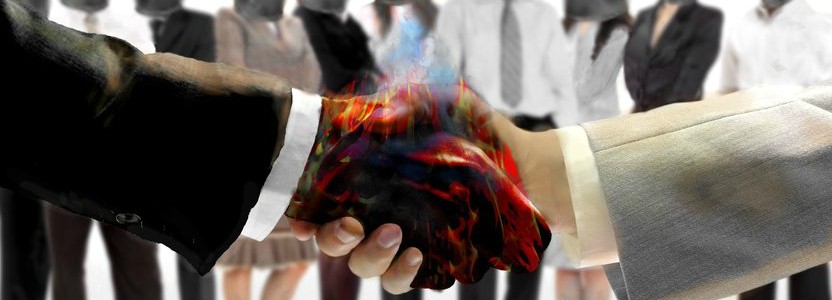I once worked with an Art Director who had just arrived in the UK from a stint at Leo Burnett in Venezuela. As well as alarming tales of armed guards outside his office, he told me this: when pitching, it was usual practice for the agencies involved to be paid their expenses and for the winning agency to pay the others a gratuity. A 'parachute payment', in the modern parlance.
In London, he had a rude awakening. It was the nineties recession and I explained to him that the prevailing climate meant competition was so fierce, and agencies so hungry to pitch, they wouldn't dream of asking for any payment from the potential client, let alone expect a consolation fee from the winner. But I conceded the Caracas model was appealing and made everyone's efforts more worthwhile. I even fancifully hoped such a routine could be established once the economy recovered.
Of course that never happened. The economy did recover (although only as a temporary arrangement), but creative shops continued to absorb all the costs of pitching, gambling their losses on winning the account. And that's how it has remained. Until now, it seems.
Very little astonishes me about the advertising business. I've seen too many ludicrous situations and heard tell of a thousand more. Nevertheless, the news that some clients are demanding agencies pay them to pitch, is an outstanding exception.
The pitching scenario has always heavily favoured the client. They hold all the aces. Yes, there is the rare occasion when a business is so desperate to be on the roster of a hot shop they make all the running. But  the rest of the time the lure of the budget, and kudos of another win, is sufficient to persuade an agency to put together - and pay for - a presentation, a document, a shed load of boards and whatever else they believe will make them irresistible.
Most of the time I don't really have a problem with this. But when such a rather one sided relationship is abused, I do. Very much so.
Let me sketch out a scenario. A large, national holiday company is looking for a new agency to handle their conceptual and creative marketing account. They invite 18 agencies to express an interest. After the tender stage, they invite 14 of them to pitch. Yep, they only eliminate four. Naturally, all 14 shops go to work. Copywriters start crafting headlines, Art Directors get busy with the scamps, account handlers ... do some stuff with Excel. Over the next couple of months 14 pitches take place. That's hundreds of working hours, masses of preparation, the materials, the documents and the pizza - times 14. At the end of the process, the holiday company awards the business to ... nobody. They decide not to take on a new agency after all.
Now imagine they'd charged all 14 suppliers to pitch to them. They would have pocketed the fees and skipped off into the sunset pictured on their brochures.Fortunately they didn't (for this actually happened), otherwise their lovely posh offices may have needed the same protection as Leo Burnett in Caracas.
Back to the present and BAA, the airport people, have crossed the Rubicon. They've been inviting PR outfits to pitch to them, and they've been caught charging the agencies to do so. I say 'caught' because I genuinely believe this is behaviour worthy of shame. As Sarah Williams of The Drum notes:
"It isn't unusual to start working on a pitch at 6.00pm in the evening after the days & business is complete; staff give up their personal time, agencies often stump up for take-aways to sustain the team through the night."
Almost everyone in the creative industry is used to this palaver and for the most part, accepts it with good grace. But to be charged for the honour of a week's worth of little sleep, a lot of stress and the anxiety of the presentation itself, is nothing short of greedy, cynical and disingenuous. Frankly, BAA should be taking themselves into a cool, dark room and having a long hard think about their business practices.
I'm pleased to say this is not yet the norm (not in the UK, anyway) and some clients are still very generous in the way they arrange pitches. But like all bad behaviour, there is the danger this 'pay-to-pitch' model will catch on. So it's essential we stamp out the spark before it becomes a fire - acting as one and flatly refusing to take on a pitch where a fee to the client is involved. Remember when the banks suggested we may have to pay to use an ATM? They only retreated when consumers let them know that would never be acceptable.This is the same principle.
If the fear of missing out on new business starts to grip us, we should laugh in its face. After all, who wants to embark on a long-term commercial relationship when the courting ritual has been so tarnished? No, our job is to ensure any companies tempted to make a fast buck in this mean, arrogant way, always fail to attract the quality supplier they seek.
Who's with me?
Magnus Shaw - copywriter, blogger and broadcaster
www.magnusshaw.co.uk
www.creativepool.co.uk/magnusshaw





